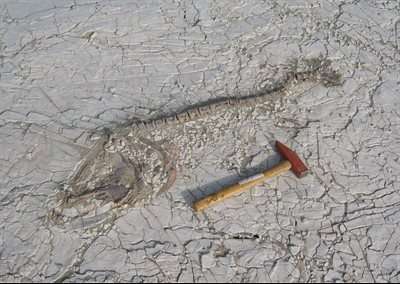June 30, 2015 report
Study shows Lake Mega-Chad dried up far more quickly than thought

(Phys.org)—A trio of researchers from the University of London and King's College, studying the history of Lake Chad has found that the lake was reduced to its current size very quickly just 1,000 years ago. In their paper published in Proceedings of the National Academy of Sciences, Simon Armitage, Charlie Bristow and Nick Drake describe how they conducted "a reconstructed lake level history for the ancient Lake Mega-Chad," and what they found by doing so.
For many years, Earth scientists have theorized that the remains of Lake Mega-Chad (a huge lake that once existed where Lake Chad now sits in central Africa—on the borders of Nigeria, Chad, Cameroon and Niger) provide the fertilizer for the Amazonian rainforest, thousands of miles away in South America—without a constant infusion of nutrients the lush vegetation would disappear because nutrients are washed away by the constant rainfall. This new study of Lake Mega-Chad now casts some doubt on that theory.
By studying the geography of Lake Chad and the area around it using satellite imagery to make out ancient shorelines, an area that was once covered by water (the Bodélé basin) the researchers found that the region underwent a drying spell some 5,000 years ago, that has lasted to this day. Prior to that, the area had been humid, with a lot of rain, which fed Lake Mega-Chad, the largest lake in the world at that time. But then, something happened and the rains began to slow, which caused the lake to shrink rapidly, just a thousand years ago, much more recently than has been thought. When the lake shrank, it left behind thousands of years of silt deposits (which dried up and formed sand dunes) which has been carried by the wind, perhaps all the way to South America—but only for the last thousand years—which begs the question, where was the Amazon basin getting its fertilizer before that time? Or does it mean that the fertilizer in the dust from the former Lake Mega-Chad simply falls into the ocean, implying that the Amazon basin has been getting its fertilizer from somewhere else all along?
More information: West African monsoon dynamics inferred from abrupt fluctuations of Lake Mega-Chad, Simon J. Armitage, Proceedings of the National Academy of Sciences, DOI: 10.1073/pnas.1417655112
Abstract
From the deglacial period to the mid-Holocene, North Africa was characterized by much wetter conditions than today. The broad timing of this period, termed the African Humid Period, is well known. However, the rapidity of the onset and termination of the African Humid Period are contested, with strong evidence for both abrupt and gradual change. We use optically stimulated luminescence dating of dunes, shorelines, and fluviolacustrine deposits to reconstruct the fluctuations of Lake Mega-Chad, which was the largest pluvial lake in Africa. Humid conditions first occur at ∼15 ka, and by 11.5 ka, Lake Mega-Chad had reached a highstand, which persisted until 5.0 ka. Lake levels fell rapidly at ∼5 ka, indicating abrupt aridification across the entire Lake Mega-Chad Basin. This record provides strong terrestrial evidence that the African Humid Period ended abruptly, supporting the hypothesis that the African monsoon responds to insolation forcing in a markedly nonlinear manner. In addition, Lake Mega-Chad exerts strong control on global biogeochemical cycles because the northern (Bodélé) basin is currently the world's greatest single dust source and possibly an important source of limiting nutrients for both the Amazon Basin and equatorial Atlantic. However, we demonstrate that the final desiccation of the Bodélé Basin occurred around 1 ka. Consequently, the present-day mode and scale of dust production from the Bodélé Basin cannot have occurred before 1 ka, suggesting that its role in fertilizing marine and terrestrial ecosystems is either overstated or geologically recent.
Journal information: Proceedings of the National Academy of Sciences
© 2015 Phys.org



















